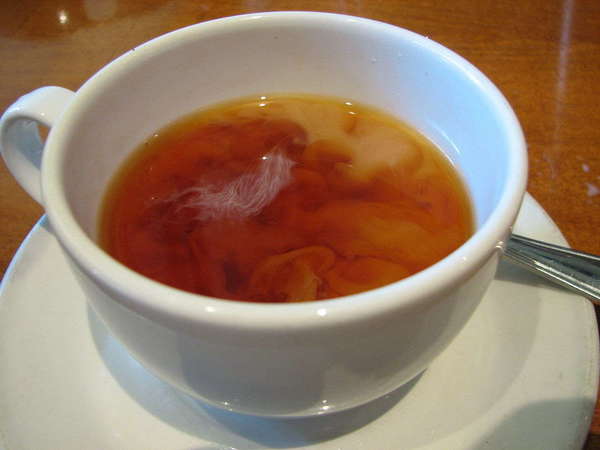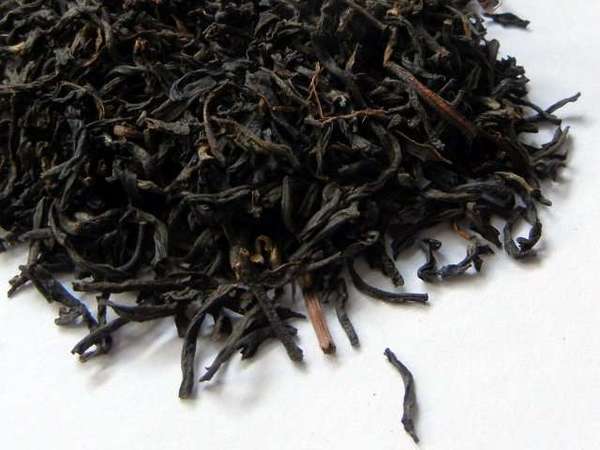Adding Milk to Tea
Wikipedia: Tea#MilkLast Updated: Jul. 30, 2018Adding milk or cream to tea is a common practice in a number of cultures, especially in Western tea culture, but also in India and some other countries. Usually, milk is only added to black tea, but people occasionally add milk to other types of tea or herbal tea as well.
What happens when you add milk to tea?
 Tea with Milk. Photo © Xavier Snelgrove, CC BY-SA 2.5.
Tea with Milk. Photo © Xavier Snelgrove, CC BY-SA 2.5.The tea also binds to tannins in the tea, compounds responsible for bitter flavor, astringent mouthfeel, and a dark color. Adding even a small amount of milk tends to drastically reduce the bitterness and astringency in a cup of tea, which is one of the reasons people add it.
The reduction of bitterness and astringency probably contributes to the sensation of sweetness more than the sugar itself.
 Tannic black teas like this Assam often taste good with milk. Photo by Alex Zorach, CC BY-SA 4.0.
Tannic black teas like this Assam often taste good with milk. Photo by Alex Zorach, CC BY-SA 4.0.Teas suitable for adding milk
As milk dramatically changes the character of a tea, the teas that taste best to you without milk are probably not the same teas that taste best with it. Many tea connoisseurs frown at adding milk to any tea, and there are some slight differences of opinion on which teas taste best with milk, but some clear patterns emerge.Usually, strong, dark black teas, such as those usually considered breakfast teas, are the ones that go best with milk. These include Assam, Ceylon, some Kenyan and Yunnan teas, and some flavored teas that have such teas as a base, such as Earl Grey. These teas tend to be high in tannins; low-tannin teas like Darjeeling first flush or Golden monkey, typically do not work well with milk.
Most authorities echo these recommendations. Golden Moon Tea's blog recommends adding milk, if desired, to black tea, and especially avoiding them with green, oolong, and white teas. The Spruce points to tannic black teas, and harsher green teas including gunpowder, as the best candidates for milk, and recommends avoiding adding milk to white, oolong, and Pu-erh teas.
How and when to add the milk
There has been a surprising amount of debate on when it is preferable to add milk to tea. If milk comes into contact with boiling or near-boiling water, it causes the proteins to denature, leading to a curdling effect. This can produce undesirable effects for flavor, appearance, and mouthfeel of the cup, but, since taste is subjective, some people may actually prefer tea in which the milk has curdled. The other problem when adding milk is that the milk while the tea is still steeping can decrease the brewing temperature. As most black teas are best-brewed with boiling water, this can produce a substandard cup.The Guardian explores this and recommends brewing tea in a teapot, and then adding milk later after it is poured into cups, thus solving both the problem of water temperature and milk curdling. Another solution would be to use a basket infuser or tea ball, steep the tea to satisfaction, and then add milk.
Does adding milk influence the health benefits of tea?
Tea has been established to have numerous health benefits. There has been some debate on whether or not milk interferes with these positive effects. Proteins in milk have been established to bind to the antioxidants in tea, but this may only slow, not stop, the absorption of these generally beneficial compounds.The science on this topic is inconclusive, and points to a variety of complex interactions that are poorly understood. One study found that skim milk reduced the antioxidant capacity of tea more than whole or lowfat milk; the presence of the fat seems to somehow mediate the effect of the milk on the antioxidants.[1] Some studies have found that milk binds to antioxidants, but a study of actual absorption by the body found that the milk had no effect on antioxidant absorption.[2]
We could find no solid evidence th at milk has a strong effect, positive or negative, on the health effects of tea. The primary reasons for avoiding adding milk to tea are flavor, personal taste, or avoiding milk for dietary reasons.
Cream? Half-and-half? Whole milk, low-fat, or skim milk?
Milk comes in a range of fat contents. Typical whole milk or "full fat" milk is around 3.5-4% milkfat. The dairy industry separates fat from this milk, producing a range of products including half-and-half (10-18%) and cream (widely variable and defined differently in different countries, typically 15-40%.) In cold climates, using high milkfat cream can be more common.There is an increasingly strong case for favoring whole-milk dairy products. Based on this overwhelming evidence we do not recommend low-fat or skim milk for people concerned about health impacts. This recommendation is also supported by a study which found that skim milk decreased the antioxidant capacity of tea significantly more than whole milk.[1]
References
1. Lisa Ryan, Sebastian Petite, "Addition of whole, semiskimmed, and skimmed bovine milk reduces the total antioxidant capacity of black tea", Nutrition Research, Vol. 30, No. 1, Jan 2010, pp. 14-20.
2. Peter C.H. Hollman et. al., "Addition of milk does not affect the absorption of flavonols from tea in man", Free Radical Research, Vol. 34, No. 3, July 7, 2009, pp. 297-300.

